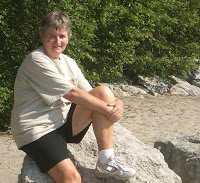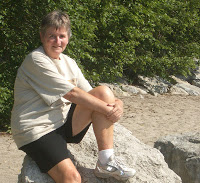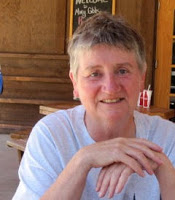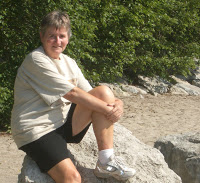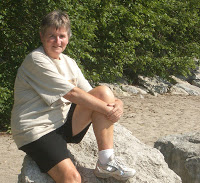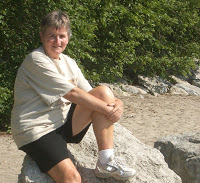I bet I could have given each of you a hundred guesses and not one of you would have come to the conclusion that my goofy tale would be the story of cashing in a savings certificate. Neither would you have been thinking North Dakota! Those of you who know that part of the world well are in for a special treat. Those of you who don’t will see how much you have missed, and want to jump on the next Greyhound bus to Fargo.
In 2010, Betsy joined friends for a week’s cycling trip around northern North Dakota. I, as usual, went along in our camper van. It so happened that I had a CD coming due at Bank of the North* while we were away so planned to liquidate it at the branch in Minot, a town of almost 50,000 people at that time, and so quite the Big City by North Dakota standards.
The planned morning found me in line at the branch bank somewhere near the town center. The line was slow, with only one teller, and it was no secret to anyone that I was a stranger in town. So of course the questions started. Where was I from and what was I doing in Minot? Every time they said Minot I had a terrible urge to say why not? but managed to control myself. Since then I have discovered, somewhat to my disappointment, that it is not an original response, and in fact there are actually t-shirts with the logo,
MINOT
Why not?
Anyway, these were nice, friendly, people, who looked in horror at me and each other when I explained about this group of cyclists pedaling fifty to a hundred miles each day in the August heat. They shook their heads and said ‘oh no!’ a lot.
Fueled by these reactions, I recounted how this group of friends had originally met while cycling across the country; 3200 miles from ocean to ocean. This was very satisfactorily greeted by more head-shaking, tut-tutting and and many an ‘oh no!’
The line was moving, if slowly, as I told my tales, and eventually I found myself facing a dismayed teller.
‘Oh no!’ she waved my papers sadly at me.
‘We don’t have that kind of money here.’
She glanced fearfully over her shoulder lest some armed bank robber was creeping up behind her, just waiting for her to produce this king’s ransom. I hadn’t thought of it as a huge amount, but this was a tiny one-room bank.
Shaking her head fervently, she repeated, in case I had missed it the first time,
‘Oh no!’
As she picked up the phone receiver she explained,
‘You need to go to the Main Branch,’ (definitely capitalized)
‘I’ll let then know you’re on your way. That’s your white van isn’t it?’
She nodded, all knowing, at my camper van outside the window. Without needing any acknowledgement, she continued,
‘So … go the way you’re headed, turn left at the next street by the Conoco station and ……’
‘Oh no!’ came two voices in unison from behind me.
‘No. Oh no!’ one continued. ‘She’s not from here. She’ll get lost if she goes that way. She needs to go down to the church and turn there …’
‘Oh no!’ the other rejoined. ‘She’ll have to deal with the one-way streets then. And the flea market. She should go …’
Other voices joined.
Completely ignored in the heated discussion, I suddenly noticed the old woman at the end of the line, which by now was at a complete stand-still, waving me over in her direction. Warily, I left my coveted spot at the head of the line and moved back.
She lightly touched my shoulder, directing my gaze out of the window, and pointed a bony old finger. There, not more than three blocks away, stood a tall brick building proudly bearing, in bright red lights, the words,
BANK of the NORTH
I whispered my thanks and slid silently from the office while those inside continued the hotly-contested argument. I have often wondered how long it took them to notice I was gone.
In the event, the journey was very simple, but as I approached I was amazed to see a young man in a dark business suit leap off the sidewalk and wave me joyously into one of several available parking spaces. He gallantly opened my door. When was the last time anyone had done that, I tried to remember.
‘Found us OK then?’ He beamed a congratulatory smile.
‘Didn’t get lost?’
‘Oh no!’ I replied gravely.
The bright smile faded as soon as we settled at his desk and he studied my letter.
‘Oh no!’ He shook his head sadly. ‘This is not our series of numbers. This is not a Bank of the North CD. Oh no!’ he repeated firmly.
Patiently I pointed to the large Bank of the North letterhead.
He simply stared, too confused even to say, oh no!
‘I originally bought it at Bright Side Savings and Loan. That got bought out by Belvedere Bank which then was swallowed up by Bank of the North. It’s a five-year CD,’ I added kindly, ‘and a mighty lot can happen in the banking merger business in five years.’
I almost added an oh yes! for emphasis, but managed not to.
‘So actually, you see,’ I continued, as he still seemed in need of clarification, ‘It is yours. Now.’
The poor man loosened his tie and took off his glasses.
‘Oh no,’ he regained his voice, ‘I have never seen one of these. Please excuse me for one moment.’
He almost bowed before scuttling off to a glass-enclosed office where I could see him gesturing emphatically to an older man in a pinstriped suit which made him, obviously, senior to my poor young man is his plain and rather well-worn black. Pinstripe picked up the phone and shortly they were joined by an elegant older woman. They waved my letter about and talked animatedly on the phone and to each other. A young woman arrived at my chair with coffee to keep me happy while I waited. It was served in a flowered cup with gilt edging and came complete with shortbread cookies resting in the matching saucer, an ensemble to make my grandma’s heart sing.
At last all three emerged from the glass office and headed my way en masse, pushing their triumph before them.
‘We have it now,’ the woman gushed. Not an oh no! in sight.
‘If you would just step over to the counter with me …’
‘Can I get two hundred of that in cash?’ My horrified brain heard the words running out of my mouth before it could stop them.
‘Oh no.’ She sounded very distressed. ‘That would be ….’
My brain rushed to get my mouth under firm control.
‘Never mind,’ I hastily assured her, ‘It’s not important. I don’t need a thing. Oh no!’
A few weeks ago I was in a Denver branch of Bank of the North, arguing over a ten dollar charge with a teenage manager with spiky hair.
Had he said oh no! just once, I would have given him the damn ten dollars.
But he didn’t and so I didn’t.
Oh How I sometimes long for North Dakota!
* There is no such bank. Nor do the other banks mentioned exist. I do not wish to identify the actual bank involved, which is in fact a large and well-known bank with branches all over the country.
© 2013
About the Author
I was born and raised in England. After graduation from college there, I moved to the U.S. and, having discovered Colorado, never left. I have lived in the Denver-Boulder area since 1965, working for 30 years at IBM. I married, raised four stepchildren, then got divorced after finally, in my forties, accepting myself as a lesbian. I have been with my wonderful partner Betsy for thirty years. We have been married since 2013.
